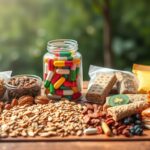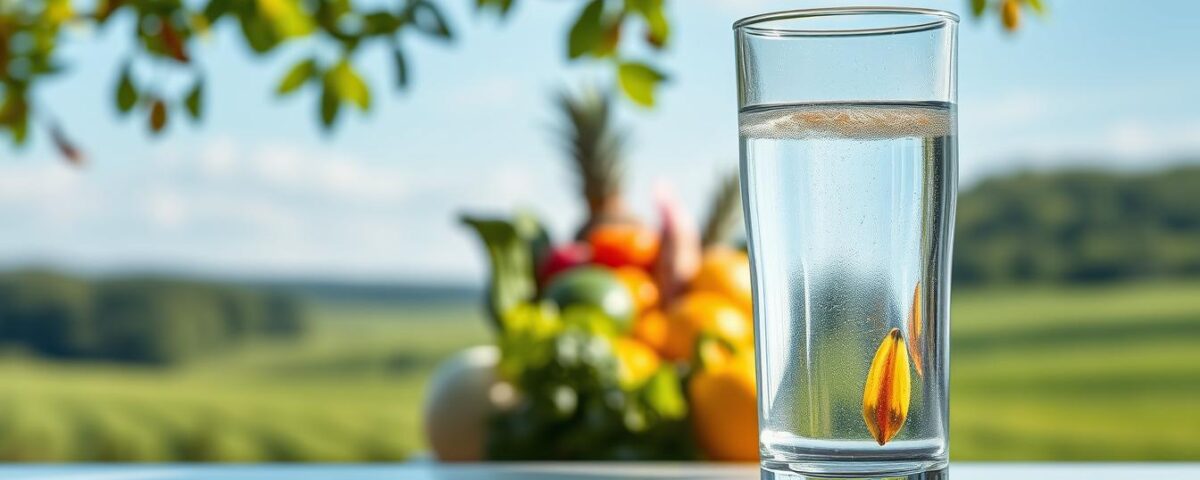
Immune-Boosting Snacks You Can Take on the Go
April 25, 2025
How to Use Everyday Spices to Supercharge Your Immunity
April 25, 2025I’ll never forget the day I realized how much water impacts my well-being. After a hectic week of deadlines, my energy crashed, and I felt foggy-headed. My doctor asked one simple question: “Are you drinking enough?” That moment changed how I view every sip.
Our bodies are 60% water, according to Nutri Advanced. Think of it as a highway for nutrients and waste removal. Without proper fluid intake, even basic functions slow down—like white blood cells moving through the lymphatic system to fight invaders.
I’ve learned that staying hydrated isn’t just about quenching thirst. It’s like giving your body a daily tune-up. When I prioritize my water intake, I feel sharper, lighter, and more resilient. Small choices—like swapping soda for herbal tea—add up.
Key Takeaways
- Water makes up 60% of the human body and supports critical processes.
- Proper fluid intake helps transport infection-fighting cells efficiently.
- Mild dehydration can weaken your body’s ability to respond to threats.
- Consistent hydration supports detoxification and nutrient delivery.
- Simple swaps, like infused water or herbal teas, make hydration enjoyable.
Let’s explore how this everyday habit quietly strengthens your defenses. You might be surprised how a glass of water can be your simplest health hack.
The Critical Connection Between Water and Immune Health
A nutritionist once told me, “Water is your body’s best communicator.” That clicked when I started tracking my daily habits. Turns out, those afternoon slumps weren’t just stress—they often aligned with low fluid intake.
How Hydration Supports Vital Bodily Functions
Here’s what surprised me: blood plasma is 90% water, according to Nutri Advanced. This liquid highway carries nutrients to cells and whisks away waste. Without enough fluids, blood thickens, slowing everything from oxygen delivery to toxin removal.
I noticed changes when I prioritized my water intake. My energy stabilized, and brain fog lifted. Research shows even mild dehydration can reduce blood cell flexibility, making it harder for them to navigate tight spaces. Imagine traffic jams in your veins!
The Role of Lymphatic Fluid and White Blood Cells
Your lymphatic system depends on water-rich fluid to transport infection fighters. Think of it as a sanitation crew—lymph fluid sweeps away debris while white blood cells patrol for invaders. When I’m dehydrated, this process feels sluggish, like wading through molasses.
A study I read found that dehydration reduces lymphocyte activity by 15-20%. Now, I keep a glass nearby all day. Small sips add up, keeping my body’s defenses nimble and responsive.
Hydration immune system role: How Water Fuels Cell Communication
A 2021 sports medicine study caught my eye—athletes who skipped water breaks showed slower reaction times to simulated threats. This mirrors how our cells behave when dehydrated. Messages between infection fighters get delayed, like texts stuck in poor service areas.

Enhancing Immune Signal Pathways
Think of cytokines as text alerts your body sends during invasions. Research shows dehydration weakens these signals by 30%, per a Nutri Advanced review. I tested this during flu season—keeping my water intake steady helped me bounce back faster than colleagues who relied on coffee alone.
Judo athletes in a controlled study had reduced saliva antimicrobial proteins after intense training without fluids. Their bodies struggled to neutralize oral bacteria—a frontline defense. Now I sip herbal infusions during workouts to avoid similar gaps.
Maintaining Optimal White Blood Cell Function
Neutrophils—your rapid-response team—need fluid to engulf invaders. A dehydrated state makes them sluggish, like trying to run through syrup. I noticed fewer mid-day energy crashes when I started carrying a reusable bottle.
My favorite hack? Adding lemon slices to warm water in the morning. It kickstarts digestion and provides vitamin C—a double win for immune health. Small tweaks like this help me stay consistent throughout the day without feeling overwhelmed.
Practical Strategies for Staying Hydrated for Immune Support
After forgetting my water bottle during a hike last summer, I learned the hard way how quickly dehydration can zap energy. Now, I use simple tricks to keep my body fueled without overcomplicating things.
Everyday Water Intake Tips and Tools
My stainless steel bottle goes everywhere—it’s like a security blanket. Brio Water’s research convinced me: people who track their intake drink 40% more daily. I set phone reminders every 90 minutes for quick sips.
Herbal teas and citrus-infused water make hydration feel special. I avoid sugary drinks—they leave me thirstier. Nutri Advanced’s tip about pre-meal glasses works wonders for digestion too.
Adapting Hydration Habits During Exercise and Heat
During spin class, I add electrolytes to my bottle. Sweating drains nutrients faster than plain water can replace them. In hot weather, I drink before feeling thirsty—it’s like sunscreen for my insides.
Incorporating Water-Rich Foods into My Diet
Cucumber slices and watermelon cubes became my snack staples. Soups and smoothies count toward daily fluid goals too. When I eat these, I notice clearer skin and steadier energy throughout the day.
Small changes create big shifts. What works for me might surprise you—try one tweak this week and see how your body responds.
Conclusion
My journey with hydration began when I discovered how water quietly powers our defenses. Research from Nutri Advanced and Brio Water confirms it: every sip helps cells communicate, flush toxins, and maintain peak function. What started as a simple habit became my daily health ritual.
Small changes made big differences. Carrying a reusable bottle kept my intake steady. Swapping sugary drinks for herbal teas transformed my afternoons. Now I notice fewer energy dips and quicker recovery when bugs circulate.
Your body thrives on consistency—not perfection. Even mild dehydration can slow critical processes, as studies show. But staying fueled doesn’t require complex routines. Start with one change: add citrus slices to your morning glass, or set hourly sip reminders.
Science and experience agree: prioritizing water supports your immune system like nothing else. Ready to feel the difference? Grab that bottle and take the first step. Your future self will thank you.
FAQ
How does drinking enough water help my body fight off germs?
When I stay hydrated, it helps my lymphatic fluid move smoothly, which carries infection-fighting white blood cells. Water also flushes out toxins and keeps mucous membranes moist, acting as a barrier against pathogens.
What are signs that dehydration might be weakening my defenses?
If I feel fatigued, get frequent headaches, or notice dry skin, it could mean I’m not drinking enough. Chronic dehydration slows down cell communication and makes it harder for my body to respond to threats like viruses.
How much should I drink daily to support my health?
While needs vary, I aim for 8-10 cups of fluids daily. I adjust based on activity, climate, or if I’m sick. Herbal teas or water-rich foods like cucumbers also count toward my total intake!
Does sweating during workouts affect my immune function?
Yes! Intense exercise or heat increases fluid loss. I sip electrolyte-rich drinks during long workouts to replenish minerals and keep my cells functioning optimally. Staying balanced helps avoid stress on my body’s defenses.
Can eating certain foods replace drinking water?
Foods like watermelon, oranges, and spinach boost hydration, but they shouldn’t replace plain water. I pair them with consistent sipping throughout the day to maintain energy and nutrient delivery for my white blood cells.



